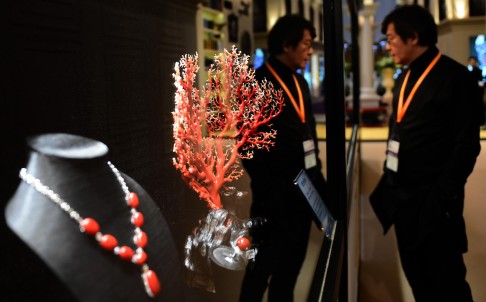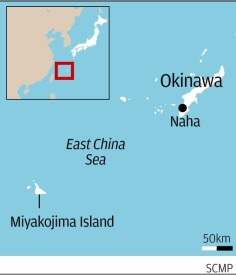Japan plans to launch crackdown on Chinese coral poachers in its waters
Tokyo seeks amendment to fisheries pact so it can crack down on Chinese fishermen looting seabed off Okinawa for prized red corals
PUBLISHED : Tuesday, 25 March, 2014, 11:06pm
UPDATED : Tuesday, 25 March, 2014, 11:06pm
Julian Ryall in Tokyo

Frustrated at what it claims is a continuing problem of Chinese fishermen taking coral from waters around the Okinawa islands, the Japanese government is to file a request with Beijing to amend a bilateral fisheries pact to permit Japan's coastguard to launch a crackdown on the poachers.
"We consider coral poaching by Chinese vessels in the seas around Okinawa a grave issue that has had a bad influence upon Okinawan fishermen's key fishing grounds," a spokesman for the Foreign Ministry in Tokyo told the South China Morning Post.

"Last year, Japan raised this issue in the Japan-China Joint Fisheries Commission, which comprehensively discusses bilateral issues concerning fisheries and the two countries reached an accord to co-operate in eliminating coral poaching," the official said.
Despite the agreement, he added, the poachers were still operating off Okinawa.
"[The number of] Chinese vessels carrying out coral poaching is still increasing," he said. "Japan will work to bring a resolution to this issue ... and present the problem to China, including at the next Japan-China Fisheries Commission."
The poachers are particularly keen to get their hands on rare red coral - known in the jewellery trade as precious coral - which is often found in waters between the main island of Okinawa Prefecture and Miyakojima island, though only at depths of 100 metres or more.
The poachers use trawling nets and grappling hooks to scour the seabed, causing huge amounts of damage to the entire undersea environment. Ultimately, conservationists fear, the slow-growing coral may be pushed to extinction. But when precious coral sells to the jewellery industry for as much as 6 million yen (HK$456,000) per kilogram, poachers have few qualms about the damage they cause.
Globally, the wholesale market for jewellery coral is estimated to be worth as much as 6 billion yen a year, with Japan, Taiwan and Italy the leading producers.
And while the Japanese coastguard would normally have the right under domestic laws to apprehend the poachers, a loophole in the fisheries agreement signed in 1997 means that Chinese vessels operating in waters south of 27 degrees latitude and north of the boundary of the East China Sea are exempt from the existing regulations.
It is this clause that Tokyo wants to rewrite and is hoping that Beijing will agree to its request.
Given the animosity that exists between the two nations at the moment, however, particularly over the sovereignty of the nearby Diaoyu/Senkaku Islands, Beijing's reply is not a certainty.
In recent years, as many as 200 Chinese boats, primarily operating from ports in Fujian and Zhejiang provinces, have been identified poaching inside Japan's territorial waters.
The most recent bout of ill-feeling between Japan and China over territory in the East China Sea can be traced back to an incident in September 2010, when the captain of a Chinese trawler rammed his vessel into a Japanese coastguard patrol ship in waters close to the Diaoyu Islands, which Japan calls the Senkakus.
That triggered a sharp exchange of diplomatic protests between the two governments and, with tensions still running high, it is likely that another clash will further worsen the situation.
